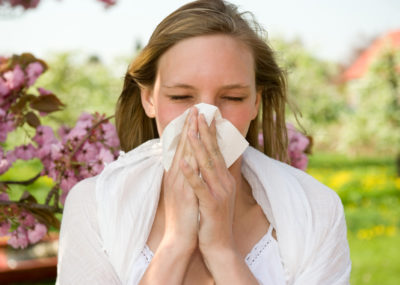You are not powerless when it comes to resisting bronchitis, sinus infections, hay fever, and colds. There are many lifestyle strategies and home remedies which you can implement once you understand how respiratory problems develop.
It is not just exposure to pollen or a virus that is involved in respiratory illness.
You may be surprised to know that hay fever and allergies are an overreaction of the immune system and the liver to certain proteins. Allergic reactions are not simply a respiratory reaction, but a total body response.
You need to strengthen your whole body, not just suppress symptoms. Since strengthening does not happen overnight, improving respiratory health means looking at your lifestyle and making adjustments. Many allergy sufferers did not always have allergies, but began to get them as time progressed.
Instead of suppressing symptoms and possibly exacerbating the condition, the natural approach is aimed at correcting underlying imbalances and assisting your body to heal. Some experts believe that continually suppressing symptoms actually weakens the immune system and may predispose you to developing more serious conditions such as autoimmune disorders. Natural health experts recommend getting to the root of the problem.
So often, people say, “I have to work today. I feel terrible, but they really need me, so I will take this antihistamine or other medication and drag myself through the day. ” Unfortunately, what seemed like a reasonable idea (after all it is only an upper respiratory illness and nothing serious) goes south when two weeks later you are still dragging around, feeling terrible, or sitting at your doctor’s office requesting an antibiotic.
There is a better way, but it does require you to make an investment of time and energy.
First, people today do not get enough sleep. When you constantly do not get enough rest, a low-grade state of chaos arises within your body. You may not even recognize it if you have not been getting enough rest and relaxation for months, years, or decades.
Start your new health journey by ensuring that you get enough sleep each night. If you do get sick, the best thing that you can do for yourself is take time out and sleep even more.
For the prevention phase of illness, i.e. your daily life, ask yourself these questions. Do you have a spiritual retreat each day? What kind of relaxation techniques do you employ daily? Are you getting physical exercise every day? Optimally, your exercise is regularly occurring in nature. Is there an aerobic component? Aerobic exercise boosts the health of the immune system. It helps your circulation and it gets your lungs working. Deep breaths associated with vigorous exercise help to oxygenate your entire body. Those deep breaths help secretions within the lungs to clear instead of simply becoming breeding grounds for bacteria and other nasty substances.
The hidden secrets of making herbal medicines…right at your fingertips!
Do you laugh regularly? Many studies have been conducted that have found laughter increases the ability of the immune system to function optimally. Fun and laughter are not a luxury. They are an essential component of any wellness plan.
Do you have people in your life who bring you down? You feel stressed, drained, or feel badly about yourself when you are around them. Chemical messengers that are involved in emotions work very closely with the messengers that govern the immune response of your body. Surround yourself with people who appreciate you for who you are.
Do you feel overwhelmed? Delegate priorities and tasks, and consider lowering your standards for some things. So the kitchen floor doesn’t get mopped today or the house isn’t perfectly in order. The grass can grow another day before you mow it and the world won’t come to an end. Incorporate time management techniques. Realize that there is never going to be enough time in the day to get everything done.
Are there foods which you eat that precipitate illness or make you vaguely feel poorly? First of all, pay attention to how different foods make you feel. Fill up on the ones that make you feel good and do not eat the ones that don’t.
Use local honey regularly as a sweetener if you have allergies. Local honey contains local pollens. Essentially, you get a homeopathic dose of local pollen each time that you consume pure unfiltered, unheated, local honey. In time, you will build up immunity to the pollens.
Take a look at your diet. If you are overweight, lose weight. Did you know that being overweight actually depresses the function of your immune cells? If you have an elevated blood sugar from eating two donuts, the white blood cells that fight infection do not function as well.
Include foods that enhance the health of your immune and respiratory system. Garlic, ginger, fresh fruits and vegetables, raw nuts, seeds, and whole grains keep your body healthier and energized. Include adequate amounts of protein, but do not overdo it.
Limit dairy products. Small amounts of hard cheese contain a great deal of flavor, protein, and calcium. Some people find that consuming yogurt helps to reduce the frequency and intensity of allergic reactions, especially to grass pollens.
Be sure to get lots of magnesium in your diet. Magnesium can modulate the immune response, reducing uncomfortable symptoms. Sources of magnesium include bananas, kidney beans, soy, almonds, lima beans, molasses, whole wheat flour, brown rice, and peas.
Get lots of vitamin C by eating fresh fruits and vegetables. Include a variety of vegetables. Intensely colored vegetables are usually the richest in phytochemicals, those compounds that ensure the health of your body in hundreds of known and unknown ways. Orange-colored vegetables contain beta carotene. Your body converts beta carotene to vitamin A, another potent vitamin which will help you to stay well.
Stay hydrated. Respiratory secretions clear more easily when they are thin. The lymphatic fluid which contains the substances to fight infection needs to be kept flowing freely.
Respiratory illnesses are on the rise, and we only have to look at our culture of chemicals and commercially produced foods to see the major culprit in this health issue. The good news is that you do not have to be a victim to respiratory illness. Many of these preventative measures will help you stay well.












